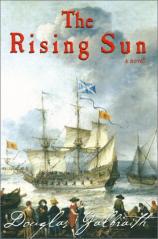The Rising Sun
Review
The Rising Sun
I've often thought that there are Boy Books and Girl Books. I
realize that this seems fearfully retro and unfeminist, not to
mention easy to disprove: I know men who adore THE GOLDEN NOTEBOOK
and women who are enamored of Hemingway. What I'm getting at,
though, isn't really a generalization about who will like what.
Rather, it's an attempt to home in on a type of novel in which
certain elements are absent and others are in the ascendant.
This is a Boy Book, by which I mean that the plot dominates; the
action is conducted mostly in the public spheres of politics, work,
carousing, and all-around masculine adventure; there are almost no
female characters (and when there are, they tend to be whores or
crones); and the voice is that of a detached, ironic observer.
First published in the UK (one of the six blurbs quoted on the back
cover, by the way, is by a woman), THE RISING SUN is a first novel
by a young Scotsman about a dark chapter in the history of his
country: the disastrous attempt, in 1698, to found a colony called
Caledonia in Darien, the part of the world now known as
Panama.
THE RISING SUN could be pegged as: (a) sea story, (b)
young-man-coming-of-age saga, and (c) tale of the white man's
effort to tame an unruly tropical wilderness, HEART OF DARKNESS
style. The combination is reminiscent of Conrad and Melville, of
course, and perhaps, less ambitiously, the rousing shipboard
adventures of C. S. Forester and Patrick O'Brian. But to me the
book seemed to owe even more to the picaresque first-person novels
of the 18th century and later --- Fielding, Defoe, Swift, Dickens;
this resemblance is made explicit by Galbraith's decision to cast
the entire story as a journal kept by one Roderick Mackenzie,
Superintendent of Cargoes for the expedition. No omniscient
narrator here, but no baring of the soul, either, for Mackenzie is
keeping this record for posterity; he compares himself to Herodotus
and writes: "I must give up the lacy vanities of biography for the
solemn weight of History... Willing or no, I am the historian of
Caledonia." Galbraith adds to the effect by embellishing THE RISING
SUN with a consciously archaic subtitle (really more like a
paragraph): "Being a True Account of the Voyage of the Great Ship
of that Name, the Author's Adventures in the Wastes of the New
World, and his Attendance at the Crimes and Betrayals that have so
lately Aggrieved these Islands." (Compare Daniel Defoe's A JOURNAL
OF THE PLAGUE YEAR: "Being observations or memorials of the most
remarkable occurrences, as well public as private, which happened
in London during the last great visitation in 1665. Written by a
Citizen who continued all the while in London. Never made public
before.")
The framework and the language do make THE RISING SUN feel
immensely authentic, almost as if it were a genuine 17th-century
document, with brown and curling edges and those esses that look
like effs. But because Galbraith seems more concerned with creating
a correct period piece than with reaching the emotional heart of
his story, the device of the journal serves merely to put Mackenzie
and the other characters at a further remove from the reader. (Kind
of like Scorsese's Age of Innocence movie, which got the minutiae
right, but missed the larger point.) It is difficult to care about
the Darien colonists, despite their tragic fate.
The expedition never achieved its goal of bridging the isthmus with
a road that would relieve European trading ships of the need to go
around Cape Horn (the southernmost point of South America) to reach
the ports of the East, thus reducing the journey from two months to
two days. Scotland was supposed to control access to this short cut
and reap profit from it. Instead, Spain made war on the colony;
England forbade other countries from trading with it; and, most of
all, the land itself soon had the Scotsmen drenched, sick, starving
for protein, and fighting among themselves. But there is little
tension about the sad outcome, which is ominously prefigured at
every step and described by a young man dulled and made cynical by
the greed and self-delusion he has observed. Even the atrocities
seem anticlimactic.
Don't misunderstand me: The book, all 535 pages, is beautifully
written, its plot ironies cleverly crafted. It just didn't move me.
Bear in mind, however, that I am a Girl Book person all the way
(another recent and much praised historical novel, THE PAPER
CONSPIRACY, left me similarly cold). If you, male or female, are
fond of Boy Books and thoroughly sick of reading about the inner
life, you may find this confident first novel as refreshing as a
dip in the salt sea.
Reviewed by Kathy Weissman on January 23, 2011
The Rising Sun
- Publication Date: March 30, 2001
- Genres: Fiction, Historical Fiction
- Hardcover: 352 pages
- Publisher: Atlantic Monthly Press
- ISBN-10: 087113781X
- ISBN-13: 9780871137814









